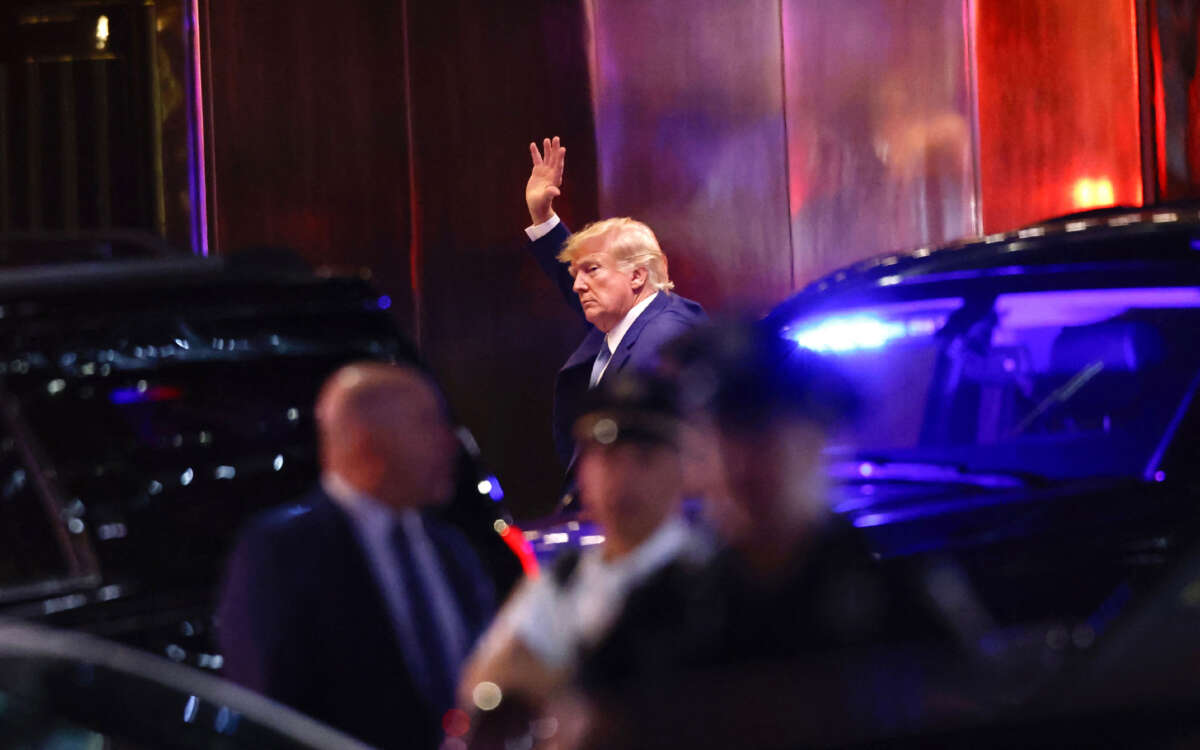In the wake of former President Donald Trump’s indictment earlier this month by the Manhattan District Attorney’s office, Republicans in Congress are pushing bills that would punish state-based prosecutors who have already brought charges against Trump and protect the former president from facing similar charges in the future.
The bills are largely symbolic and have virtually no chance of becoming law, as the Senate is controlled by Democrats and President Joe Biden would likely veto the legislation if it ever reached his desk. Nevertheless, the proposals showcase the lengths Republicans are willing to go to demonstrate loyalty to the former president, who will likely be criminally charged for his efforts to usurp the 2020 presidential election.
The Accountability for Lawless Violence In our Neighborhoods Act — also known as the ALVIN Act — was introduced by Rep. Andy Biggs (R-Arizona), one of the fiercest Trump loyalists in the House. The bill’s title is a direct reference to Alvin Bragg, the Manhattan District Attorney who charged Trump with 34 counts of falsifying business records relating to his attempts to cover up alleged extramarital affairs during the 2016 presidential campaign.
The bill would specifically ban Bragg’s office from receiving federal funding to investigate Trump, Biggs said in a statement, claiming that the Manhattan District Attorney “weaponized” his position by spending “thousands of federal taxpayer dollars to subsidize this political indictment and is demanding millions more in federal grants.”
In reality, federal funding that Bragg has received has gone toward other investigatory efforts in the city. While Bragg’s predecessor, Cy Vance, spent $5,000 in federal grants on the investigation into Trump, Bragg has said that he himself has not spent a dime of federal funds on the investigation into the former president.
Separate legislation, introduced by a different Republican lawmaker, seeks to protect Trump from other potential prosecutions, including a Fulton County, Georgia, inquiry that many legal experts feel has an even higher chance of resulting in a Trump conviction than the Manhattan District Attorney case.
In that case, Trump could be charged by Fulton County District Attorney Fani Willis over his attempts to coerce state officials to “find” him enough votes to overturn Biden’s victory in Georgia.
A bill from Rep. Russell Fry (R-South Carolina) would bar prosecutors like Willis from trying former presidents and vice presidents in state courts. Under the legislation, if a former president faces charges from state-based officials like Willis, the case would be litigated in a federal court.
The proposal is impractical, as it would require federal judges to familiarize themselves with state laws in order to understand the charges being read against former presidents. It’s also hypocritical, legal experts have pointed out.
“It does seem a little ironic coming from people who tout states’ rights and how state courts and state legislatures should be making even more decisions than they currently do,” David Rapallo, an associate professor at Georgetown University Law School, told HuffPost.
Such a law would likely result in friendlier trials against Trump, as he and Republicans appointed a flurry of judges during his tenure, naming close to 3 in 10 active federal judges (28 percent).
The bill has the backing of Rep. Jim Jordan (R-Ohio), the current chair of the House Judiciary Committee. “One of the pieces of legislation we expect to bring forward real quickly from our committee is legislation [that says] if you are going to do something like this, you at least have to remove that case to federal court,” Jordan told Fox News in reference to Fry’s bill.
Jordan is currently trying to investigate Bragg in retaliation for the charges he brought against Trump. In response, Bragg has filed a lawsuit against Jordan, arguing that a Judiciary Committee investigation into his indictments against Trump is a “brazen and unconstitutional attack” against him.
Bragg argued in his lawsuit that Jordan’s requests for documents and testimony are a “transparent campaign to intimidate and attack” him, and that such a move violates the tenets of the American judicial system.
“Basic principles of federalism and common sense, as well as binding Supreme Court precedent, forbid Congress from demanding” the types of documents and testimony Jordan is trying to obtain, the lawsuit added.
Join us in defending the truth before it’s too late
The future of independent journalism is uncertain, and the consequences of losing it are too grave to ignore. To ensure Truthout remains safe, strong, and free, we need to raise $22,000 by the end of today. Every dollar raised goes directly toward the costs of producing news you can trust.
Please give what you can — because by supporting us with a tax-deductible donation, you’re not just preserving a source of news, you’re helping to safeguard what’s left of our democracy.
